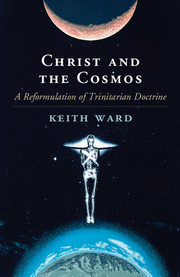Book contents
- Frontmatter
- Contents
- Preface
- Acknowledgements
- PART I THE THREEFOLD NATURE OF THE DIVINE BEING
- PART II THE BIBLICAL SOURCES OF TRINITARIAN THOUGHT
- PART III THE TRINITY, IMMANENT AND ECONOMIC
- PART IV THE SOCIAL TRINITY
- 22 Persons and Substances
- 23 The Idea of a Personal and Free Creation
- 24 The Logical Uniqueness of Persons
- 25 The Divine Nature and Freedom
- 26 Freedom in God and in Creatures
- 27 Persons as Necessarily Relational
- 28 An Ontology of the Personal?
- 29 Intra-Trinitarian Love
- 30 Infinite Gods
- 31 Divine Love and Necessity
- 32 Love and Alterity
- 33 Trinity versus Monotheism
- 34 The Passion of Christ
- 35 God and Abandonment
- PART V THE COSMIC TRINITY
- Bibliography
- Subject Index
- Name Index
34 - The Passion of Christ
from PART IV - THE SOCIAL TRINITY
Published online by Cambridge University Press: 05 September 2015
- Frontmatter
- Contents
- Preface
- Acknowledgements
- PART I THE THREEFOLD NATURE OF THE DIVINE BEING
- PART II THE BIBLICAL SOURCES OF TRINITARIAN THOUGHT
- PART III THE TRINITY, IMMANENT AND ECONOMIC
- PART IV THE SOCIAL TRINITY
- 22 Persons and Substances
- 23 The Idea of a Personal and Free Creation
- 24 The Logical Uniqueness of Persons
- 25 The Divine Nature and Freedom
- 26 Freedom in God and in Creatures
- 27 Persons as Necessarily Relational
- 28 An Ontology of the Personal?
- 29 Intra-Trinitarian Love
- 30 Infinite Gods
- 31 Divine Love and Necessity
- 32 Love and Alterity
- 33 Trinity versus Monotheism
- 34 The Passion of Christ
- 35 God and Abandonment
- PART V THE COSMIC TRINITY
- Bibliography
- Subject Index
- Name Index
Summary
Moltmann's ‘social’ doctrine of the Trinity really begins, however, from the passion of Christ and with the insistence that this manifests the suffering of God. God is passionate love and is revealed by Christ's passion to be one who is intimately affected by the suffering of others – one who suffers with others. This is a powerful argument, though it is not an argument which could apply to the relationship of diverse persons within the Trinity. This is because it would seem that the Trinitarian persons, if there were no created world, would have no reason to suffer, and so there is no place for compassion among the divine persons.
Moltmann denies this, for he says, ‘The love with which God … loves the world is no different from the love he himself is in eternity’ (Moltmann, 1981, p. 59). God's eternal intra-Trinitarian love is the same as God's love for the world. Since God's love for the world, in all its suffering, involves empathetic suffering, then God's eternal love ‘contains the pain of the negative’ (Moltmann, 1981, p. 57). There is a sort of ‘contradiction’ or ‘rift’ within the divine being, even in eternity. It is hard to see why this should be so if there is no world of sufferers in existence and if the divine persons do not suffer themselves.
However, Moltmann's general argument entails that God must create the world: ‘God “needs” the world and man’ (Moltmann, 1981, p. 58), because love seeks fellowship and desires response. It is not enough for God to love beings exactly like God; there must also be an unlike other to love. Moreover, ‘creation means … self-humiliation’ (Moltmann, 1981, p. 59). Creation itself entails suffering, in which God must share. Though he says that immanent and economic Trinities are identical, Moltmann makes this true by making creation, suffering, and sin to be necessary objects of divine love. This makes such love a sharing in suffering and a bearing of the cost of sin. There is no eternal Trinity in the sense of a Trinity without and apart from creation. There is only the Trinity as it is necessarily involved in going out from itself into creation and ‘suffering love’.
- Type
- Chapter
- Information
- Christ and the CosmosA Reformulation of Trinitarian Doctrine, pp. 207 - 210Publisher: Cambridge University PressPrint publication year: 2015



